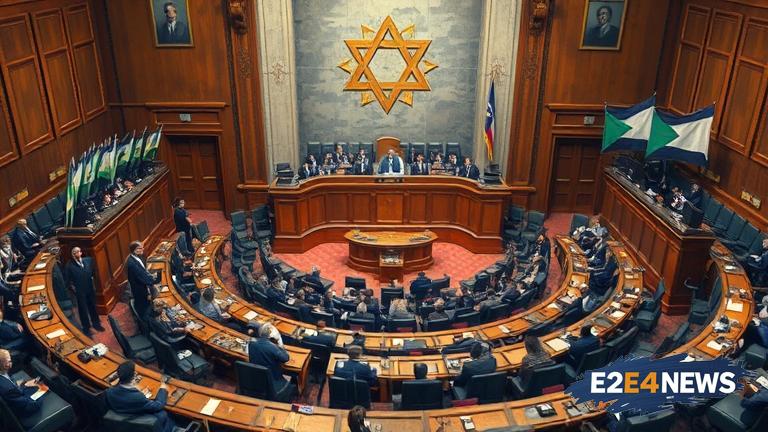The Israeli Knesset was thrown into chaos when a lawmaker was removed from the premises for referencing genocide in Gaza. The incident occurred during a heated debate on the Israeli-Palestinian conflict, with tensions running high among lawmakers. The expelled lawmaker, who has not been named, made the comment in response to a statement from another member of the Knesset. The comment was deemed inflammatory and sparked a heated exchange between lawmakers. The Knesset’s speaker was forced to intervene, calling for order and eventually removing the lawmaker from the chamber. The incident has sparked widespread controversy, with many criticizing the lawmaker’s comment as insensitive and inflammatory. Others have defended the comment, arguing that it highlights the harsh realities of the Israeli-Palestinian conflict. The incident has also sparked a wider debate about the use of language in the Knesset, with some arguing that lawmakers should be free to express their opinions without fear of reprisal. However, others argue that certain language is unacceptable and should not be tolerated. The Israeli-Palestinian conflict is a highly sensitive and complex issue, with both sides having deeply held convictions and emotions. The conflict has been ongoing for decades, with periods of relative calm punctuated by outbreaks of violence. The Gaza Strip, which is home to over 2 million Palestinians, has been a particular flashpoint in the conflict. The area has been subject to numerous military operations and blockades, leading to widespread poverty and humanitarian suffering. The international community has been critical of Israel’s actions in Gaza, with many arguing that they constitute a form of collective punishment. The use of the term genocide to describe the situation in Gaza is highly controversial, with some arguing that it is an accurate description of the humanitarian crisis. Others argue that the term is exaggerated and unfair, and that it does not accurately reflect the complexities of the situation. The incident in the Knesset has sparked a wider debate about the use of language in the conflict, with some arguing that it is time for a more nuanced and respectful dialogue. However, others argue that the use of strong language is necessary to highlight the injustices and suffering of the Palestinian people. The Israeli government has been criticized for its handling of the conflict, with many arguing that it has failed to take adequate steps to address the humanitarian crisis in Gaza. The government has argued that its actions are necessary to protect Israeli citizens from terrorist attacks, but others argue that this is a pretext for a broader policy of oppression and occupation. The incident in the Knesset has also sparked a debate about the role of lawmakers in the conflict, with some arguing that they should be free to express their opinions without fear of reprisal. However, others argue that lawmakers have a responsibility to promote respectful and constructive dialogue, rather than inflaming tensions with provocative language. The international community has been watching the situation in the Knesset with interest, with many calling for a more nuanced and respectful approach to the conflict. The United Nations has been critical of Israel’s actions in Gaza, and has called for an end to the blockade and a negotiated settlement to the conflict. The European Union has also been critical of Israel’s actions, and has called for a more constructive approach to the conflict. The incident in the Knesset has sparked a wider debate about the future of the Israeli-Palestinian conflict, with some arguing that it is time for a new approach. Others argue that the conflict is too complex and deeply ingrained to be resolved through dialogue and negotiation alone. The situation in the Knesset remains highly volatile, with tensions running high among lawmakers. The incident has sparked a wider debate about the use of language in the conflict, and the role of lawmakers in promoting respectful and constructive dialogue. The international community will be watching the situation closely, with many calling for a more nuanced and respectful approach to the conflict.





